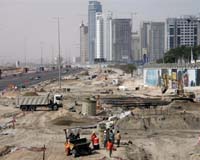 |
Seoul (UPI) Dec 28, 2009 South Korea won a landmark deal to build nuclear reactors for the United Arab Emirates, boosting calls for lifting Seoul's self-imposed ban on nuclear activities to tap bigger atomic reactor markets. A South Korea-led consortium beat U.S. and French rivals and clinched a $40 billion deal to build and operate four nuclear power plants in the United Arab Emirates, in one of the world's biggest nuclear power contracts, Seoul's energy and industry ministry said Monday. The deal marks South Korea's first export of a nuclear power plant and its single largest overseas construction project in terms of value, it said. With the deal, South Korea becomes the world's sixth exporter of nuclear power plants. South Korean President Lee Myung-bak rushed to the Middle Eastern country last weekend, leading a high-profile mission to help win the contract. The deal calls for the consortium, led by state-owned utility Korea Electric Power Corporation, to build four 1,400-megawatt reactors by 2020 in Sila, some 330 kilometers west of Abu Dhabi. The consortium includes five other South Korean firms -- Hyundai Engineering and Construction, Samsung C&T Corp., Doosan Heavy Industries and Construction, Korea Nuclear Fuel and the Korea Hydro and Nuclear Power Co. The U.S. firm Westinghouse Electric Co. and Japan's Toshiba Corp. will provide components to Doosan, South Korea's top power-generation equipment maker. Under the contract the consortium will also provide nuclear fuel, help manage the plants and conduct maintenance over 60 years. The United Arab Emirates promised to import the fuel it needs for the reactors instead of enriching uranium or reprocessing spent nuclear fuel into plutonium, which can be used in nuclear bombs, in a bid to allay concerns by the United States, which has been at odds with Iran over its declared plans to use enriched uranium to generate electricity. The United States and its allies, including South Korea, are also pressing North Korea to drop its nuclear weapons programs in exchange for economic and electricity aid. South Korea described the deal with the United Arab Emirates as a "milestone on the road to an era of South Korean-made nuclear power plants," expressing hope it would kick-start an export drive for its nuclear technology. "South Korea's competitiveness in the field of nuclear power is becoming highly recognized in the international community," said Kim Young-hak, vice minister for energy and industry. Seoul has been in talks with Turkey over nuclear power reactors and plans to bid for a Turkish nuclear power plant construction project. Turkey is pushing to build four nuclear plants, each costing about $5 billion, along the coast of the Black Sea. The bids are expected to be called in the first half of next year, the ministry said. The World Nuclear Association estimates that by 2030 the world will need 430 new nuclear power plants worth more than $1 trillion. South Korea is looking to make more deals to get a share of that market. But officials and analysts said Seoul's self-imposed ban on nuclear activities could be an obstacle for atomic reactor deals, stressing that the restriction should be lifted to allow Seoul to reprocess nuclear materials and become a nuclear powerhouse. There are no binding international rules that ban the enrichment and reprocessing of nuclear materials for peaceful purposes. But South Korea, under a 1974 accord with the United States, pledged to win U.S. permission before engaging in nuclear activities. The agreement came after former military strongman Park Chung-hee, who ruled the country from 1961-79 on a strict anti-communist platform, pursued nuclear weapons to deter threats from North Korea. South Korea has "been limited even in peaceful nuclear activities or uses of atomic energy that are widely recognized by the international community," ruling lawmaker Chung Ok-nim said. Chung and many other lawmakers and officials said South Korea under the 1974 accord cannot produce mildly enriched uranium, a key fuel for running atomic energy plants, even though it is running 20 nuclear power plants across the country. It imports all its nuclear fuel. Some 40 percent of South Korea's electricity comes from atomic energy but the country can't complete the so-called nuclear fuel cycle, from securing nuclear fuel to reprocessing, using domestically produced materials, without relying on foreign sources. South Korean officials said they hope to revise the 1974 nuclear agreement, which expires in March 2014. Chang Moon-hee, a senior official at the state-run Korea Atomic Energy Research Institute, said the deal with United Arab Emirates would add momentum for revision of the accord. "The (United Arab Emirates) deal will boost South Korea's status in the use of nuclear energy and bolster its position in the upcoming talks with the United States," Chang said.
Share This Article With Planet Earth
Related Links Nuclear Power News - Nuclear Science, Nuclear Technology Powering The World in the 21st Century at Energy-Daily.com
 SKorean-led group wins 20.4-billion-dollar UAE nuclear deal
SKorean-led group wins 20.4-billion-dollar UAE nuclear dealAbu Dhabi (AFP) Dec 27, 2009 The United Arab Emirates has awarded a 20.4-billion-dollar contract to build four nuclear power plants to a South Korean-led consortium, the Emirates Nuclear Energy Corporation said Sunday. The UAE "has determined that the Korea Electric Power Corporation (KEPCO) team is best equipped to fulfill the government's partnership requirements in this ambitious programme," ENEC chairman Khaldoon al ... read more |
|
| The content herein, unless otherwise known to be public domain, are Copyright 1995-2009 - SpaceDaily. AFP and UPI Wire Stories are copyright Agence France-Presse and United Press International. ESA Portal Reports are copyright European Space Agency. All NASA sourced material is public domain. Additional copyrights may apply in whole or part to other bona fide parties. Advertising does not imply endorsement,agreement or approval of any opinions, statements or information provided by SpaceDaily on any Web page published or hosted by SpaceDaily. Privacy Statement |